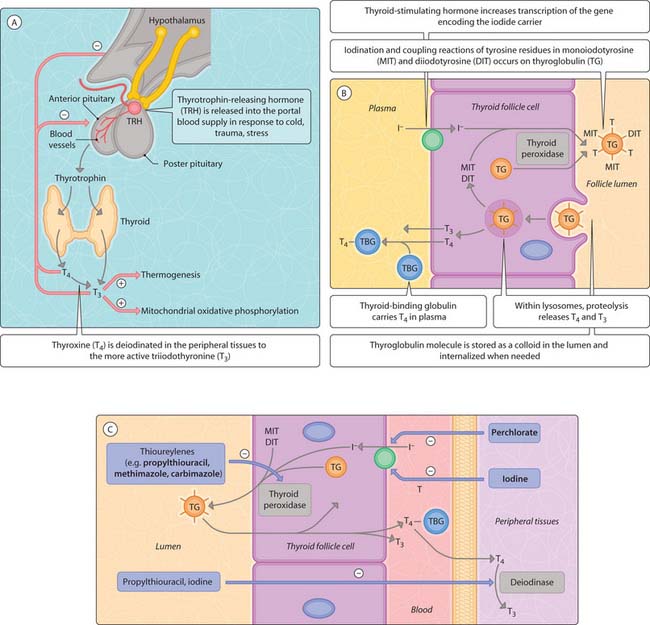24 Thyroid disorders
The thyroid hormones triiodothyronine (T3) and thyroxine (T4) play an important role in development (physical and cognitive), metabolism (carbohydrate, lipid, protein), body temperature regulation and have a direct action on various organs(e.g. increased cardiac function) (Fig. 3.24.1). In hyperthyroidism (or thyrotoxicosis), there is an endogenous overproductionor excessive ingestion of thyroid hormones. Examples include Graves’ disease (diffuse toxic goitre), thyroiditis, thyroid-stimulating hormone (TSH)-secreting adenoma, and multinodular goitre. Graves’ disease is an autoimmune disease caused by TSH antibodies, which bind to and activate TSH receptors on target cells. A characteristic feature of Graves’ disease is protruding eyes caused by binding of the TSH antibody to a TSH receptor-like protein in the retro-orbital connective tissue, leading to swelling in muscle and connective tissue behind the eye. Other symptoms of hyperthyroidism are a result of the increase in metabolic rate, resulting in increased skin temperature, sweating, weight loss, tremor and palpitation, owing in part to excessive β-adrenoceptor stimulation. In contrast, hypothyroidism is a failure by the thyroid to synthesize and release thyroid hormones. Examples include Hashimoto’s thyroiditis, atrophic thyroiditis, postablative therapy, iodine deficiency and genetic disorders involving the synthesis of thyroid hormone. Hashimoto’s thyroiditis is an autoimmune disease caused by production of antithyroid antibodies (e.g. antithyroid peroxidase, antithyroglobulin). Symptoms include lethargy, cold intolerance, weight gain and constipation. A lifelong impairment in cognition and abnormal skeletal muscle development is a characteristic feature of cretinism.
< div class='tao-gold-member'>






